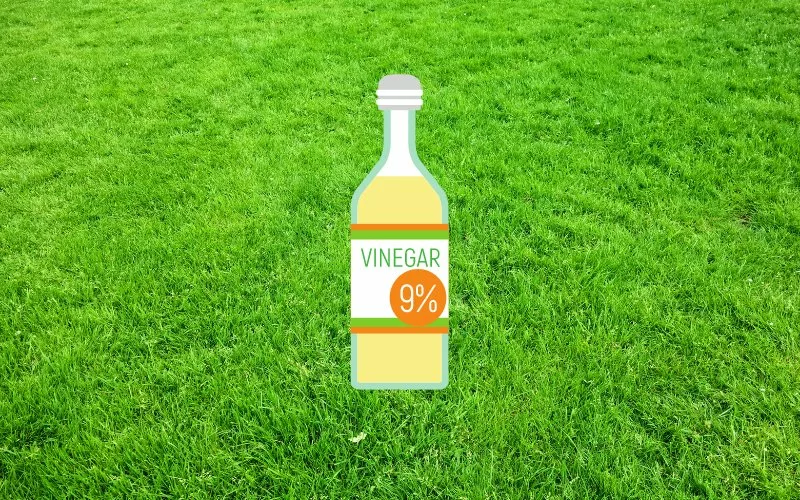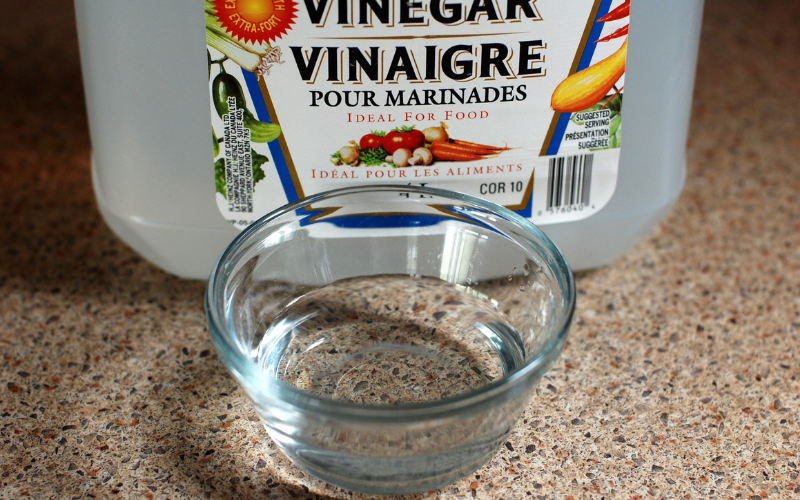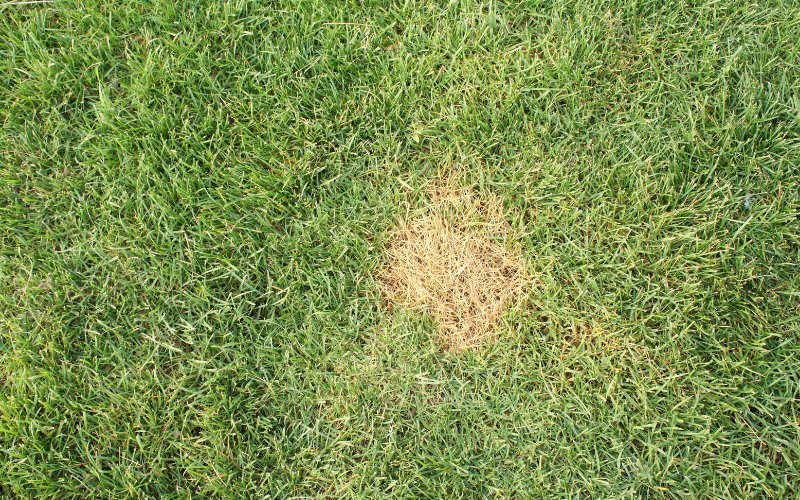As people have become aware of the dangers of conventional herbicides, many have tried alternatives. Vinegar is a popular alternative to try. Will vinegar kill grass? Read on to find out.

Does Vinegar Kill Grass?
Household vinegar will not kill established grass. It may burn the blades, but it will not kill the roots. The grass just grows more blades without a problem. Seedlings less than two weeks old will die, however. This is especially true of broadleaf seedlings such as St. Augustine.
What Is Vinegar?
Vinegar is made of water, acetic acid (CH3COOH), and small amounts of other chemicals, including flavoring. Household vinegars are usually 5% acetic acid. Industrial vinegars are usually 10%-20% acetic acid, with 20% being the most common. Acetic acid this strong is very dangerous. It will burn eyes, mucus membranes, and skin. It can blind you if it gets into your eyes. Breathing the fumes is hazardous, as well.
Apple Cider Vinegar Versus White Vinegar
Apple cider vinegar is made from apples. The juice goes through a two-step fermentation process: sugar is turned into alcohol, then alcohol is turned into vinegar. It is then filtered and pasteurized. White vinegar is made from corn mixed with water. The distilled grain alcohol is fermented and filtered after distillation.
Related Article: What Kills Grass: A Comprehensive Guide

What Does Vinegar Do To Grass?
Vinegar ruptures the cell membranes. As the fluid in the cells is released, it evaporates. The part of the plant touched by the vinegar rapidly dehydrates and dies. Parts of the plant that are not touched by the vinegar do not die.
Does Vinegar Kill Grass Roots?
No. It only kills the part of the grass it touches. It becomes inert when it touches the soil.
Will Grass Grow Back After Vinegar?
Yes, unless the grass seedlings are under two weeks old. In that case, the roots are not developed enough to grow new blades. Broadleaf grasses are more likely to die back to the soil, but the roots will grow new leaf blades anyway.
Does Vinegar Kill Grass Permanently?
No, it only kills the blades. The roots are not affected.
How Fast Does Vinegar Kill Grass?
Plants treated with vinegar wilt within about 24 hours.
Does Vinegar Kill Grass Seed?
No, the coating on the seed protects it. Grass seed that is in the soil will germinate normally.

Why Doesn’t Vinegar Kill Your Grass?
Vinegar is not taken into the grass’s roots. Since the roots are healthy, they simply send new growth out to become new grass blades. Vinegar becomes inert, or harmless, when it touches soil, so it does not damage the roots under the soil.
What to Use Instead Of Vinegar to Kill Your Grass
Because household vinegar is not labeled with the EPA as a herbicide, it is actually illegal to use it to try and kill grass. Horticultural vinegar is labeled as a herbicide, but you must have a pesticide license to use it because it is so dangerous. Even with horticultural vinegar, the roots of the grass are not damaged.
Instead of vinegar, use 2,4, D to kill broadleaf grasses such as St. Augustine. Use caution, as it will also kill flowers, which are broadleaf plants, too. To kill all types of grass, use a herbicide containing glyphosate. This herbicide is taken up by the leaf blades and transported to the roots, where it interferes with an enzyme required for growth. Glyphosate kills all types of plants, so don’t get it on anything you want to keep.
Does Vinegar Kill The Soil Microbes?
Household vinegar does not damage the soil microbes it doesn’t spill on. The soil makes the vinegar harmless, so it does not hurt the soil microbes beneath the surface of the soil.
How Do I Treat Vinegar Spills On Grass?
If you spill vinegar on mature grass, it may burn the grass blades and leave an unsightly bald patch. Immediately wash the vinegar off with water. The faster you do this the more chance you have of preventing injury to the grass. The more you dilute the vinegar, the less chance it has to burn the grass blades. If the grass blades do burn, or wilt, do not worry. The grass blades will grow back in seven to ten days.

In conclusion, household vinegar does not kill grass unless it is less than two weeks old. If the roots are established, the grass blades may burn and wilt away. However, the roots will not be injured and will simply put out new grass blades. To rescue grass from vinegar spills, dilute the vinegar by running water over the area of the spill. Even if you lose the grass blades from a spill, new grass blades will soon grow to replace them.


I want to clean my garage floor with 30% vinegar. When I hose it off, will it kill the grass it touches?
Hi Mary Ann!
It could be damaging but there are ways to avoid this. The trick here will be temperature, timing, and the amount of water you’re willing to use. Before you begin, water your lawn well around the garage to help encourage full water uptake. This should help discourage the uptake of vinegar-infused water.
Beyond that, as long as you rinse well and run some extra water on any areas where the water used to rinse your garage may have run off, you should be able to avoid any damage.
To be extra careful, undertake the cleaning project before the sun is up, while the dew is still on your lawn, on an overcast day, or while the sun is shining directly on another part of your home and yard. All of these things can help reduce any potential damage the vinegar could do to your lawn.
I hope this helps 🙂
I want to use vinegar to lower my soil ph for my lawn. My lawn is 2 month old. Will it affect the grass?
Hi Paul!
Thank you so much for asking this question. Here are the short answers followed by the longer reasoning behind these answers. First, yes, the vinegar will harm your lawn. Second, vinegar, even horticultural vinegar, should not be used to change the pH of a lawn.
I don’t know how large your lawn is, but to lower the pH by about .5 temporarily, you would need to use more than 10 gallons of conventional white vinegar for a 5,000-square-foot lawn. This amount of vinegar, if sprayed over any lawn, established or new (like yours) would severely damage it. Further, the vinegar will dramatically reduce the concentration of beneficial insects in, around, and under your lawn.
Further, adding vinegar will acidify the water in the soil more than the minerals (or “dirt”). While this will reflect in a greater change on most soil pH tests, it will not be a lasting change and this higher acidity in water can cause even more damage to plants as well as beneficial bacteria.
The best way to change your soil pH is by using granular sulfur. You can read about how to do that in this guide about sulfur and pH provided by Michigan State University. The problem with sulfur is that it takes a very long time to work, but the results can last decades. For a faster effect, you can use aluminum sulfate and, though less gentle than granular sulfur, it is far less likely to damage your lawn than vinegar would if it is applied slowly and correctly.
I hope you find this helpful 🙂
Tom.
Hi, I used vinegar 10% to spray on weeds, but now I killed the grass surrounding too. I plan to overseed and add soil with fertilizer. Can I just overseed on top of the burnt patches? Will it be okay? Thanks!!!
Hi Bev,
While you can overseed on top of the burnt patches, you will get better results if you use the tines of a garden fork, heavy rake, or hand cultivator to aerate or rough up these patches. This will help the seeds make direct contact with the soil. You will not have to remove the dead grass if you do not want to as the new sprouts will eventually overtake it. However, it will be easier for the new grass seed to cover up these dead spots if the dead grass is removed.
Before seeding, make sure to water your lawn thoroughly to help wash away or dilute any potential high-acid spots and encourage better germination.
I hope this helps 🙂
Tom.
Hi Tom, how soon after using a product called Earth’s Ally can I put down lawn soil and reseed a bare area in my lawn?
Hi Ron!
I’m not sure which “Earth’s Ally” product you used, but I’m going to guess it was the “Earth’s Ally Grass and Weed Killer” from the information you’ve provided. According to what information I could find online, this product uses a strong saltwater solution to kill grass and weeds.
Given the strength of the formulation you may have trouble getting grass seed to germinate for a minimum of 2 weeks and a maximum of about 2 months. This is with regular rain helping to dilute the concentration of salt in your soil. I would wait at least a month before reseeding directly, but 2 weeks and a heavy soak should be fine if you’re layering at least 1″ of lawn soil over where you applied the Earth’s Ally.
Hope this helps 🙂
Tom.
I brushed on 30% concentrated vinegar to each area of concrete. The next morning the grass surrounding the concrete looked dead. Would this have a permanent damaging affect to the soil where the grass died or will the grass grow back?
Hi Rosalie,
Horticultural vinegar or any vinegar with more than 20% acetic acid by volume can kill any plant it touches. However, it does quickly turn inert once it hits soil. After a few days, the soil should return to the way it was before the vinegar encountered it, sooner if you flush the area with water. New grass should completely fill in where the old grass died within a few weeks.
I hope this helps 🙂
Tom.
An unknown dog has started leaving large poop piles in the same area of my yard. I read online that 1/2 & 1/2 vinegar/water solution would discourage. Will vinegar kill the grass?
Hi Kay,
While the vinegar solution may help to stop the dog from doing his business in your yard, it will alter the look of the grass that is sprayed. Vinegar won’t kill the grass roots, but the blades will wilt and turn yellow within 24 hours. The grass will grow back just fine, but I would only suggest using this as a short-term solution. If you have to use it all the time to keep the dog away, then you’ll have a patch of yellow, wilted grass where you’ve sprayed. Good luck!
Cheers, Tom.
Well, Tom, you seem to be most knowledgeable! I have a 280 sq. ft. weed patch that I spent over four hours pulling and digging weeds. Could not get all the roots, duh. Bought a gal. of 30% vinegar Green Gobbler. My mix is: 1 gal, H2O, 1 C. GG, 1/4 C. sea salt, and a good dash of Dawn soap. I want to spray the entire area with this. Then cultivate it in. The soil is aerated, moist, and will place an 1/8″ layer of clay break and a layer of potting soil. Spread grass seed, the roll it in. Can I plant grass seed after this process or do I have to wait? Hope to have an answer. Thank you.
Hi Loren,
I would say that after any ground preparation for weed management you would want to wait a while. First, to make sure that your process has worked since you want it to, and second, to make sure that the solution has washed through the soil. Depending on the seed you have selected, some of the products may affect how the seed germinates. It seems that you have good knowledge and a solid plan of action, so I’d be interested to know how you get on. Also, I’m curious to know which weeds are in the weed patch. Some of the hardier weeds, like dandelions, will definitely put up a good fight.
Thanks for your comment, Tom.
My South Florida lawn is loaded with weeds….my lawn man doesn’t seem to know how to treat them….what can I use to get rid of these weeds and also make it pet friendly.
Thank you in advance.
Hi Mikey,
Florida lawns can be very expensive to look after, especially when it comes to weeding. Your local pest control company will have a weed program that will include several visits per year to keep the weeds under control.
Unfortunately, weed control isn’t a one-application process. It’s an ongoing job. If you want to do it yourself, you can head to Home Depot and grab a lawn weed killer that attaches directly to your watering hose. These products are an attachment that mixes the weed killer for you and has a sprayer attached. Scotts sells a product like this for less than $20.
Here’s an article I posted not long ago about the cost of TruGreen. This will give you an idea of how much these types of services cost.
https://lawnmowerguru.com/how-much-does-trugreen-cost/
Best of luck!
Tom.
We have so many huge worms in our tiny patch of lawn (North facing) and by the end of Sept, due to their activity and the British rain, 85% of the lawn turns to pure mud (worm casts). The lawn is only 3 years old and not only am I tired of mud everywhere – we have a pet – the lawn is so uneven it is in parts dangerous to step on due to the piles upon piles of worm casts.
Rather than rip everything up and start again, I heard vinegar can get rid of worms. I don’t want to give up on having a lawn and going to fake turf, so as horrible as it is to the worms, would I be able to reseed it after if vinegar finally gets the numbers of worms under control?
Hi Blightygal,
Before you try vinegar, have a look for a worm probe. This is a small electrical device that puts an electrical current into the soil. If there is one thing that worms don’t like, it’s electricity.
Worm probes are usually used by people who want to catch worms for fishing, but I know a few people who have used them to get rid of worms in their yards. The electrical current makes the worms come to the surface so that you can catch them.
Once they are out of the ground, the current keeps them out of the yard. This is a product you can find in your local store in the gardening section. You might be able to find something similar in Britain or definitely online.
Good luck catching the worms!
Cheers, Tom.
Thanks for tip, but no, nothing like that available in the UK.
Hi Blightygal,
You might try wrapping copper wire around sticks inserted into the ground. Make sure some of the wire is touching the soil. This supposedly brings the worms to the top, as the ‘fancy’ thing was supposed to do. Go fishing, THEN come back to work on your lawn!! Best of luck.-USA-Ky. Sheila